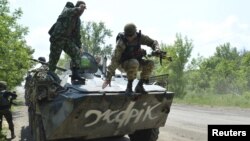Concerns are growing over the recent upsurge in fighting between Ukranian forces and pro-Russian separatists, with warnings from Ukraine's president of a full-scale war.
VOA saw a number of Ukrainian soldiers arriving at the train station in in Kramatorsk, eastern Ukraine's main military headquarters, and driving through the town in troop carriers.
Ukraine's President Petro Poroshenko has warned lawmakers to prepare to defend against "a possible full-scale invasion" by Russia, after a surge in fighting in Russian-speaking eastern Ukraine.
Poroshenko, speaking Thursday in Kyiv, cited a "colossal threat" of large-scale fighting. He said 9,000 Russian troops already are inside eastern Ukraine. Reuters last week reported a huge Russian military buildup on Russian soil, 50 kilometers from the Ukraine border.
There was renewed fighting in the region this week, which Ukrainian officials say began near Donetsk when about 1,000 pro-Russian rebel fighters, backed by artillery and tanks, launched a pre-dawn attack just west of the city.
Russia denies having any troops in Ukraine, and says any Russian citizens there are volunteers.
Rebels reported 15 civilian and combatant deaths, while authorities in Kyiv said at least three government troops were killed and 30 others wounded in the town of Mariinka.
White House: Maintain sanctions
Responding to the new violence, the White House on Thursday said President Barack Obama planned to urge European Union leaders at an upcoming summit in Germany to maintain sanctions against Moscow for its "aggression in eastern Ukraine."
EU member countries vote later this year on whether to extend their sanctions, and U.S. national security spokesman Ben Rhodes said continuing them is "the right course ... against more aggressive Russian action." He also said they needed more time to work.
A Pentagon spokesman told VOA the U.S. military was keeping an eye on the Ukraine situation:
"We follow very closely reports of an escalation in fighting and the use of heavy weapons. The full implementation of the Minsk agreements is the path to peace. The latest fighting is a big step back from that path." said the spokesman, speaking on condition of anonymity.
"It is critical that all parties respect the ceasefire and fully implement Minsk. Russia has a special responsibility to prevent these attacks and to implement the cease-fire. Separatists should not use any pretext to seize additional Ukrainian territory," the spokesman added.
'Most serious' breach
The European Union called the recent fighting the “most serious” breach of the cease-fire that was agreed to by the warring sides in February.
Speaking to reporters in Brussels Thursday, the EU's Executive Commission spokeswoman Maja Kocijancic said that the fighting is likely to create "new spiral" of violence and suffering.
Kocijancic called on the warring sides to respect the Minsk cease-fire agreement. The EU will ease or tighten sanctions on Moscow based on how well the deal is implemented.
The Minsk agreement, reached in February by France, Germany, Russia, Ukraine and pro-Russia separatists, envisions a cease-fire and withdrawal of troops and heavy weapons leading to a lasting solution to the conflict in eastern Ukraine.
More than 6,400 people have been killed since April 2014, when separatists in Ukraine's east launched the rebellion against the Kyiv government.
Russian buildup
Wednesday's fighting came one week after a Reuters correspondent published an eyewitness account of a huge Russian military buildup near the Ukraine border. The report cited troops and hundreds of pieces of weaponry marshaled on Russian soil at a makeshift firing range 50 kilometers from the Ukraine border.
It also said many Russian vehicles had been stripped of identifying markings and that many of the troops had removed insignia from their fatigues.
The report was widely seen as corroborating repeated NATO claims that Russia - despite February cease-fire - continues to provide hardware and personnel to the rebels.
NATO chief Jens Stoltenberg in May described the Russian support as "a steady flow of heavy equipment, tanks, artillery, ammunition, air defense systems and lots of training" to separatists.
The truce required both sides to withdraw heavy weapons from the line of contact. But international observers say those provisions have been routinely violated by both sides.
VOA's Jeff Seldin contributed to this report from the Pentagon Pam Dockins contributed from the State Department.





